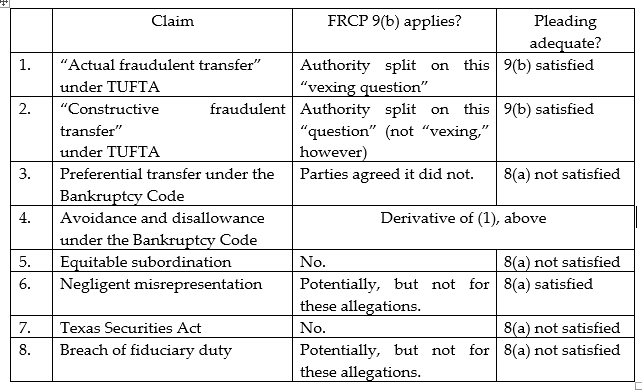 Judge James Ho’s dissent from the denial of en banc review in Gonzalez v. Trevino persuaded the ultimate audience yesterday, when the Supreme Court reversed the Fifth Circuit, and allowed the wrongful-arrest claim of Sylvia Gonzalez – an unfortunate victim of small-town politics – to proceed past the pleadings stage. No. 22-1025 (U.S. June 21, 2024). His opinion built on Judge Andrew Oldham’s dissent at the panel stage.
Judge James Ho’s dissent from the denial of en banc review in Gonzalez v. Trevino persuaded the ultimate audience yesterday, when the Supreme Court reversed the Fifth Circuit, and allowed the wrongful-arrest claim of Sylvia Gonzalez – an unfortunate victim of small-town politics – to proceed past the pleadings stage. No. 22-1025 (U.S. June 21, 2024). His opinion built on Judge Andrew Oldham’s dissent at the panel stage.
Category Archives: Pleadings – Twombly/Iqbal
 In D&T Partners LLC v. Baymark Partners Mgmnt., LLC, “[a] group of individuals allegedly sought to steal the assets and trade secrets of an e-commerce company,” and “did so with shell entities, corrupt lending practices, and a fraudulent bankruptcy.” The plainitffs’ complaint did not state a RICO claim, however:
In D&T Partners LLC v. Baymark Partners Mgmnt., LLC, “[a] group of individuals allegedly sought to steal the assets and trade secrets of an e-commerce company,” and “did so with shell entities, corrupt lending practices, and a fraudulent bankruptcy.” The plainitffs’ complaint did not state a RICO claim, however:
“While the complaint alleges coordinated theft, the alleged victims are limited in number, and the scope and nature of the scheme was finite and focused on a singular objective. … [T]his does not constitute a “pattern” of racketeering conduct sufficient to state a RICO claim ….”
No. 22-11148 (Apr. 4, 2024).
The Fifth Circuit reversed the dismissal of a securities claim against Six Flags involving its public statements about an expansion effort in China, concluding that as to some of the challenged statements, the plaintiff had satisfied the PSLRA’s demanding requirements. Oklahoma Firefighters Pension & Retirement System v. Six Flags Entertainment Corp., No. 21-10865 (Jan. 18, 2022). The opinion provides detailed discussion of just is required to adequately plead falsity and scienter, especially in the context of forward-looking statements. It also provides what appears to be the first reference in the Federal Reporter to vexillology (the study of flags):
Stringer v. Remington Arms, No. 18-60590 (Nov, 7, 2022), presents an instructive analysis of failure-to-disclose allegations, in the context of alleged fraudulent nondisclosure of a design defect in a popular rifle design.
The panel majority found a failure to satisfy Rule 9(b):
“In [plaintiffs’] complaint, they explain that they have found public resources that contradict Remington’s public statements regarding the safety of the XMP trigger. They also allege that Remington had “actual and/or physical knowledge of manufacturing, and/or, design deficiencies in the XMP Fire Control years before the death of Justin Stringer” and that the company received customer complaints regarding trigger malfunctions as early as 2008. But Plaintiffs do not make the leap to fraudulent concealment. They say merely that Remington “ignored” notice of a safety related problem.“
(applying Tuchman v. DSC Commc’ns Corp., 14 F.3d 1061, 1068 (5th Cir. 1994) (“If the facts pleaded in a complaint are peculiarly within the opposing party’s knowledge, fraud pleadings may be based on information and belief. However, this luxury ‘must not be mistaken for license to base claims of fraud on speculation and conclusory allegations.'”).
The dissent would have found that rule satisfied, based in part of the detail provided about what Remington knew: “The complaint’s allegations indicate that Remington knew about problems with the X-Mark Pro trigger before the recall but did not disclose its knowledge of those problems during the limitations period. And, contrary to Defendants’ assertion that the complaint allegations relate only to the “Walker” trigger, the deposition testimony cited in the complaint expressly references the “XMP” trigger at issue here.”
The plaintiffs in Lee v. Andrew Lawrence Collection LLC sought to register the trademark “THEEILOVE” – a phrase associated with the alma mater of Jackson State University. Then they sued that university’s licensing agent and some licensees.
The defendants successfully moved to dismiss under the infrequently-used combination of Fed. R. Civ. P. 19 and 12(b)(7), based on the university’s interest in the subject matter, and the Fifth Circuit affirmed. It reasoned:
- Interest. The university had a non-frivolous interest in the ownership of the mark based on the university’s consistent usage of it, and that interest could be “practically impaired” by a decision on that topic in this case (as distinct from an analysis of whether a judgment would in fact be preclusive). Thus, the university was a required party under Rule 19(a)(1)(B)(i).
- Proceed or dismiss? As a state university, Jackson State had sovereign immunity from suit; that interest “is necessarily impaired when plaintiffs try to use the state’s sovereign immunity to lure it into a lawsuit against its will.” That issue alone favored dismissal. The Court noted that the other, practically focused factots in Rule 19(b) also favored dismissal.
No. 20-30796 (Aug. 24, 2022). (In honor of this fairly rare analysis of Rule 19, here is a link to Paul Hardcastle’s 1985 hit Nineteen.)
The Fifth Circuit found that Petrobras did not have sufficient knowledge of a potential claim to trigger limitations in Petrobras America, Inc. v. Samsung Heavy Indus. Co., holding:
- two officers “acted in their own interests by accepting $10 million in bribes . . . [t]hus, [they] are clearly adverse agents of Petrobras. Their knowledge cannot be imputed to Petrobras.”;
- “an ujnfavorable contract alone is not a legally cognizable injury”;
- statements in SEC filings about the general topic of bribery, when they involved “separate bribery schemes [that] involved separate parties, separate contracts, and separate ships,” “at best raise fact questions not suitable for disposition under Rule 12(b)(6).”
No. 20-20339 (Aug. 11, 2021).
The Fifth Circuit reversed the Rule 12 dismissal of a Lanham Act case in which “Plaintiffs allege that Defendants purchased trademark terms as keywords for search-engine advertising, then placed generic advertisements that confused customers as to whether the advertisements belonged to or were affiliated with the Plaintiffs.” Adler v. McNeil Consultants, No. 20-10936 (Aug. 10, 2021) (LPHS represented the appellee in this matter).
 A recent antitrust case reminds of an important but infrequently-litigated point about the review of pleadings in the context of a motion to dismiss: “If an attached exhibit contradicts a factual allegation in the complaint, ‘then indeed the exhibit and not the allegation controls.'” Quadvest LP v. San Jacinto River Auth., No. 20-20447 (Aug. 3, 2021).
A recent antitrust case reminds of an important but infrequently-litigated point about the review of pleadings in the context of a motion to dismiss: “If an attached exhibit contradicts a factual allegation in the complaint, ‘then indeed the exhibit and not the allegation controls.'” Quadvest LP v. San Jacinto River Auth., No. 20-20447 (Aug. 3, 2021).
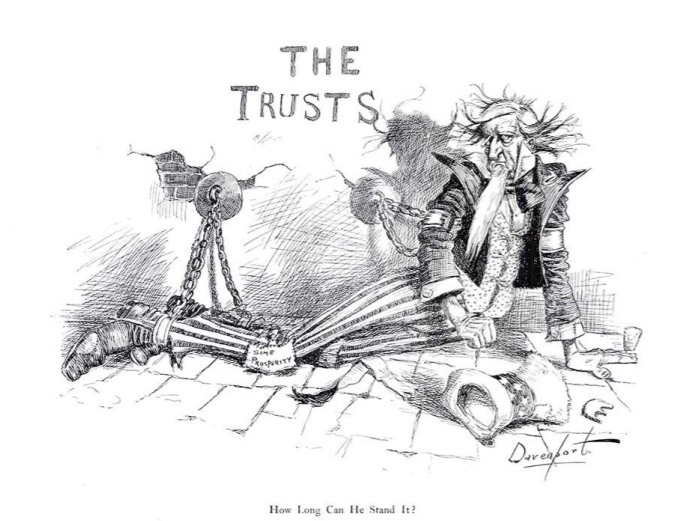 The plaintiffs in Quadvest LP v. San Jacinto River Auth. alleged that a state-created river authority violated Section 1 of the Sherman Act by unreasonably restraining the market for wholesale raw water in Montgomery County. Procedurally, the Fifth Circuit concluded that the denial of the authority’s motion to dismiss on immunity grounds was appealable under Circuit precedent (acknowledging that the Fifth Circuit is an outlier on this point). Substantively, the Court affirmed the denial of the authority’s motion “at this stage” of the case, concluding that “the Texas Legislature did not authorize [the authority’s] entry into and enforcement of the challenged [contract] provisions with the intent to displace competition in the market for wholesale raw water in Montgomery County.” No. 20-20447 (August 5, 2021).
The plaintiffs in Quadvest LP v. San Jacinto River Auth. alleged that a state-created river authority violated Section 1 of the Sherman Act by unreasonably restraining the market for wholesale raw water in Montgomery County. Procedurally, the Fifth Circuit concluded that the denial of the authority’s motion to dismiss on immunity grounds was appealable under Circuit precedent (acknowledging that the Fifth Circuit is an outlier on this point). Substantively, the Court affirmed the denial of the authority’s motion “at this stage” of the case, concluding that “the Texas Legislature did not authorize [the authority’s] entry into and enforcement of the challenged [contract] provisions with the intent to displace competition in the market for wholesale raw water in Montgomery County.” No. 20-20447 (August 5, 2021).
 “While litigants should, when possible, identify specific contractual provisions alleged to have been breached, Rule 8 does not require that level of granularity. ‘So long as a pleading alleges facts upon which relief can be granted, it states a claim even if it “fails to categorize correctly the legal theory giving rise to the claim.”‘ ” (citations omitted).
“While litigants should, when possible, identify specific contractual provisions alleged to have been breached, Rule 8 does not require that level of granularity. ‘So long as a pleading alleges facts upon which relief can be granted, it states a claim even if it “fails to categorize correctly the legal theory giving rise to the claim.”‘ ” (citations omitted).- That said — “That the pleading was sufficient in this contract dispute, governed by an agreement neither exceedingly long nor rife with addenda, exhibits, and multiple parts, does not mean that Rule 8 would necessarily be satisfied by general allegations involving more complex contracts.”
Sanchez Oil & Gas Corp. v. Crescent Drilling & Prod., Inc., No. 20-20304 (July 30, 2021).
The plaintiff in Arruda v. Curves Int’l alleged that violations of the Franchise Rule were RICO predicate acts, but the Fifth Circuit disagreed: “Congress’s omission of a private right of action in the [Federal Trade Commission Act] controls. A violation of the Franchise Rule does not itself constitute a predicate act of mail or wire fraud to support a RICO claim.” The Court cited D.C. Circuit opinion about the Service Contract Act that asked the cogent question: “If there is no implied cause of action for damages, how much the less for treble damages?” No. 20-50734 (June 28, 2021) (unpublished).
A wrongful-foreclosure case reminds of a basic Twombly principle: “Green’s breach-of contract claim in her complaint alleged that Defendants violated conditions in the deed of trust, but she never explained which part of the deed was violated. It was only in response to Defendants’ summary judgment motion that Green identified the deed’s notice requirement as the specific violation. Her failure to specify her breach-of-contract claim in her complaint warrants dismissal of that claim.” Green v. Windsor Park Asset Holding Trust, No. 20-11226 (June 18, 2021, unpublished) (per curiam).
An error in pleading jurisdiction led to an inconclusive end in Accordant Communications v. Sayer Construction, No. 20-50169 (Dec. 4, 2020):
- Accordant won a $1.4 million arbitration award against Sayer.
- Accordant sued to confirm the award in federal court.
 “As to the citizenship of the parties, Accordant alleged that it ‘is a limited liability company organized under the laws of Georgia with its principal place of business in Seminole County, Florida” and that Sayers ‘is a limited liability company organized under the laws of Texas with its principal place of business in Travis County, Texas.'”
“As to the citizenship of the parties, Accordant alleged that it ‘is a limited liability company organized under the laws of Georgia with its principal place of business in Seminole County, Florida” and that Sayers ‘is a limited liability company organized under the laws of Texas with its principal place of business in Travis County, Texas.'” - Sayer declined to answer postjudgment discovery, and on appeal argued that the district court lacked subject-matter jurisdiction (as the above allegations are based on the standards for a corporation rather than an LLC).
 Despite this ‘clearly deficient’ and ‘basic’ pleading problem, the Fifth Circuit did not dismiss the case: “Considering the evidence in the record on appeal … we find that ‘jurisdiction is not clear from the record, but there is some reason to believe that jurisdiction exists.’ Therefore, we exercise our discretion under [28 USC] § 1653 and ‘remand the case to the district court for amendment of the allegations and for the record to be supplemented,’ if necessary.” (citation omitted).
Despite this ‘clearly deficient’ and ‘basic’ pleading problem, the Fifth Circuit did not dismiss the case: “Considering the evidence in the record on appeal … we find that ‘jurisdiction is not clear from the record, but there is some reason to believe that jurisdiction exists.’ Therefore, we exercise our discretion under [28 USC] § 1653 and ‘remand the case to the district court for amendment of the allegations and for the record to be supplemented,’ if necessary.” (citation omitted).
 The dispute in Smith v. Toyota Motor Corp., No 19-60938 (Oct. 20, 2020), was whether there was diversity jurisdiction over two business entities with diverse business activities, one of which was named . . . Diversity Vuteq LLC. Despite the abundant diversity in the case, the Fifth Circuit reminded that there is not a diversity of opinion about how to properly plead citizenship:
The dispute in Smith v. Toyota Motor Corp., No 19-60938 (Oct. 20, 2020), was whether there was diversity jurisdiction over two business entities with diverse business activities, one of which was named . . . Diversity Vuteq LLC. Despite the abundant diversity in the case, the Fifth Circuit reminded that there is not a diversity of opinion about how to properly plead citizenship:
- “To adequately allege the citizenship of Toyota, a corporation, Smith needed to ‘set out the principal place of business of the corporation as well as the stat e of its incorporation.'” (citations omitted);
- “To adequately allege the citizenship of Diversity, a limited liability corporation, Smith needed to ‘specifically allege the citizenship of every member of every LLC or partnership involved in a litigation.'”
Basic Capital Management v. Dynex, No. 20-40643 (Sept. 30, 2020), reminds about the proper record for evaluating a Rule 12 dismissal mo tion:
tion:
- “[A]s the district court correctly observed, the Form 10-K and the state-court [case] record ‘are al publicly available governmental filings and the existence of the documents, and the contents therein, cannot reasonably be questioned.’ Therefore, the Form 10-K and the state-court record fall squarely within the ambit of [Fed. R. Evid.] 201(b).”
- “Rule 201(d) expressly provides that a court ‘may take judicial notice at any stage of the proceeding,’ and our precedents confirm judicially noticed facts may be considered in ruling on a 12(b)(6) motion. Therefore, in ruling on the 12(b)(6) motion, ‘the district court appropriately used judicial notice.'”
 Following two recent opinions about Fed. R. Civ. P. 9(b), the Fifth Circuit again applied it in Waste Management v. AIG: “We need not resolve this dispute because, even assuming that an adjuster can be held liable under [the] Texas Insurance Code . . . Waste did not allege facts that, taken as true, demonstrate a violation of these provisions. The only relevant, AIG Claims-specific facts that Waste alleged in its
Following two recent opinions about Fed. R. Civ. P. 9(b), the Fifth Circuit again applied it in Waste Management v. AIG: “We need not resolve this dispute because, even assuming that an adjuster can be held liable under [the] Texas Insurance Code . . . Waste did not allege facts that, taken as true, demonstrate a violation of these provisions. The only relevant, AIG Claims-specific facts that Waste alleged in its
complaint are that (1) AIG Claims served as the adjuster for ASIC and (2) ‘On July 9, 2013, AIG Claims sent Waste Management a letter denying [certain] coverage . . . .’ These threadbare factual allegations, along with Waste’s conclusory recitation of the elements of a claim under the Texas Insurance Code, are insufficient to state a plausible claim for relief. Notably, Waste did not allege that AIG Claims failed to investigate, delayed any investigation, misevaluated, misprocessed, made any misrepresentation of the policy, or otherwise failed to ‘effectuate’ a fair settlement.” (citations omitted).
 Applying Fed. R. Civ. P. 9(b), the Fifth Circuit found no fraud claims stated in:
Applying Fed. R. Civ. P. 9(b), the Fifth Circuit found no fraud claims stated in:
- Colonial Oaks Assisted Living v. Hannie Development, No. 19-30995 (Aug. 25, 2020): “The pleadings are devoid of allegations regarding what instructions the employees received, who gave the instructions, whether anyone followed the instructions, and whether Sellers were aware of the specific instructions given.
- Umbrella Investment Group v. Wolters Kluwer, No. 20-30078 (Aug. 25, 2020): “In this case, the only relevant fact that UIG has alleged beyond what little it alleges ‘on information and belief’ is that Wolters Kluwer provided ‘written certification that the property subject to the loan was not in a flood hazard area that required flood insurance under FEMA regulations pursuant to the Flood Disaster Protection Act of 1973.’ That fact alone can ground nothing more than speculation as to the cause of the error, and therefore, UIG has failed to state a claim for fraud.”
 Rules of procedure require precision in pleading a cause of action. The eight-corners rule of insurance coverage, in contrast, often rewards imprecision. A powerful example appears in Allied World Specialty Ins. Co. v. McCathern, PLLC, a duty-to-defend claim arising from a legal malpractice claim, where the Fifth Circuit held: “The allegations that McCathern did not monitor the file, conduct legal research, or communicate with the client are factual assertions—as opposed to causes of action—even if they are vague. Allied World’s challenge to the factual allegations thus seems to be that they are not specific enough or may not prove true. But at the duty-to-defend stage it is not for us to say whether West Star will be able to prove that McCathern was negligent in failing to monitor the personal injury suit or in failing to research legal issues.” No. 17-10615 (Feb. 26, 2020, unpublished).
Rules of procedure require precision in pleading a cause of action. The eight-corners rule of insurance coverage, in contrast, often rewards imprecision. A powerful example appears in Allied World Specialty Ins. Co. v. McCathern, PLLC, a duty-to-defend claim arising from a legal malpractice claim, where the Fifth Circuit held: “The allegations that McCathern did not monitor the file, conduct legal research, or communicate with the client are factual assertions—as opposed to causes of action—even if they are vague. Allied World’s challenge to the factual allegations thus seems to be that they are not specific enough or may not prove true. But at the duty-to-defend stage it is not for us to say whether West Star will be able to prove that McCathern was negligent in failing to monitor the personal injury suit or in failing to research legal issues.” No. 17-10615 (Feb. 26, 2020, unpublished).
 A substantial body of law, focused on the requirements of the Federal Rules of Civil Procedure, defines the appropriate level of specificity for a plaintiff’s complaint. Pleading specificity can interact with other bodies of law as well, such as insurance coverage, where additional detail can affect an “eight-corners” analysis of whether the allegations fall within coverage. Another illustrative, if infrequent, situation appeared in the FCA case of United States ex rel. Hendrickson v. Bank of America, N.A., where a plaintiff’s lack of detail fed into the defendants’ defense of public disclosure: “Not disputing that the six documents constituted public disclosures, Hendrickson claims they do not disclose substantially the same allegations as his complaint because they do not reference DNEs or name specific banks. The banks respond that the documents’ disclosures are as specific as the complaint, which fails to allege particular instances of their receiving DNEs or differentiate allegations made against each defendant.” No. 18-11472 (Oct. 7, 2019).
A substantial body of law, focused on the requirements of the Federal Rules of Civil Procedure, defines the appropriate level of specificity for a plaintiff’s complaint. Pleading specificity can interact with other bodies of law as well, such as insurance coverage, where additional detail can affect an “eight-corners” analysis of whether the allegations fall within coverage. Another illustrative, if infrequent, situation appeared in the FCA case of United States ex rel. Hendrickson v. Bank of America, N.A., where a plaintiff’s lack of detail fed into the defendants’ defense of public disclosure: “Not disputing that the six documents constituted public disclosures, Hendrickson claims they do not disclose substantially the same allegations as his complaint because they do not reference DNEs or name specific banks. The banks respond that the documents’ disclosures are as specific as the complaint, which fails to allege particular instances of their receiving DNEs or differentiate allegations made against each defendant.” No. 18-11472 (Oct. 7, 2019).
 “Respect for the state system and the strictly circumscribed nature of federal jurisdiction requires our unflagging attention to these limits. We expect the same unflagging attention from litigants who invoke our jurisdiction.” Accordingly, the Fifth Circuit remanded the case of Midcap Media Finance LLC v. Pathway Data, Inc. for further review of diversity jurisdiction. “The parties in this case failed to properly allege diversity of ciizenship. First, the alleged only that Coulter was a California resident, not that he was a California citizen. Second, because MidCap is an LLC, the pleadings needed to identify MidCap’s members and allege their citizenship.” No. 18-50650 (July 9, 2019) (citations omitted).
“Respect for the state system and the strictly circumscribed nature of federal jurisdiction requires our unflagging attention to these limits. We expect the same unflagging attention from litigants who invoke our jurisdiction.” Accordingly, the Fifth Circuit remanded the case of Midcap Media Finance LLC v. Pathway Data, Inc. for further review of diversity jurisdiction. “The parties in this case failed to properly allege diversity of ciizenship. First, the alleged only that Coulter was a California resident, not that he was a California citizen. Second, because MidCap is an LLC, the pleadings needed to identify MidCap’s members and allege their citizenship.” No. 18-50650 (July 9, 2019) (citations omitted).
Life Partners’ Creditors’ Trust v. Cowley, No. 17-11477 (May 31, 2019), reviewed the dismissal of several highly-technical claims brought by a bankruptcy trustee about the sale of “viaticals” (investments in life insurance policies sold to third parties by the insureds). For each claim, the Fifth Circuit reviewed whether FRCP 9(b) or 8(a) applied, and then assessed the pleaded allegations, reaching these conclusions:
 “In their Fourth Amended Complaint, the Bowmans make claims under the [Texas Debt Collection Act] without citing the appropriate sections of the statute for each claim. CitiMortgage raised this issue, and the Bowmans responded that they provided enough information for CitiMortgage to figure out which provisions it violated. As the district court reasoned, this is insufficient to provide fair notice to the defendant under Federal Rule of Civil Procedure 8(a).” Bowman v. CitiMortgage, No. 18-10867 (April 12, 2019) (unpublished).
“In their Fourth Amended Complaint, the Bowmans make claims under the [Texas Debt Collection Act] without citing the appropriate sections of the statute for each claim. CitiMortgage raised this issue, and the Bowmans responded that they provided enough information for CitiMortgage to figure out which provisions it violated. As the district court reasoned, this is insufficient to provide fair notice to the defendant under Federal Rule of Civil Procedure 8(a).” Bowman v. CitiMortgage, No. 18-10867 (April 12, 2019) (unpublished).
 Fed. R. Civ. P. 8(c) requires parties to “affirmatively state any avoidance or affirmative defense.” Germain v. U.S. Bank applied that rule in a mortgage-servicing case, reasoning: “Germain alleged that the Defendants did not comply with § 1024.41. The Defendants denied this allegation, insisting that they had complied with that section. That is a denial or direct contradiction of Germain’s claim, not an affirmative defense. The Defendants did not expressly rely on § 1024.41(i) in their answer, but the use of § 1024.41(i) in their motion for summary judgment is merely an expansion of the denial in their answer.” No. 18-10508 (April 3, 2019). (“8c” also refers to an Alfa Romeo model, pictured above for general reference.)
Fed. R. Civ. P. 8(c) requires parties to “affirmatively state any avoidance or affirmative defense.” Germain v. U.S. Bank applied that rule in a mortgage-servicing case, reasoning: “Germain alleged that the Defendants did not comply with § 1024.41. The Defendants denied this allegation, insisting that they had complied with that section. That is a denial or direct contradiction of Germain’s claim, not an affirmative defense. The Defendants did not expressly rely on § 1024.41(i) in their answer, but the use of § 1024.41(i) in their motion for summary judgment is merely an expansion of the denial in their answer.” No. 18-10508 (April 3, 2019). (“8c” also refers to an Alfa Romeo model, pictured above for general reference.)
 A colorful, and deft, summary of Iqbal’s pleading requirements in a § 1983 case appeared in Shaw v. Villanueva: “Shaw[] . . . has pleaded no specific facts showing that Villanueva and Ebrom misdirected Sotelo into issuing the arrest warrant. And so he has not established the exception to the independent-intermediary doctrine. In other words, his allegations are all broth and no beans.” No. 17-50937 (March 11, 2019). (A classic Texas Monthly article offers similar sayings, such as: “He thinks the sun comes up just to hear him crow,” etc.)
A colorful, and deft, summary of Iqbal’s pleading requirements in a § 1983 case appeared in Shaw v. Villanueva: “Shaw[] . . . has pleaded no specific facts showing that Villanueva and Ebrom misdirected Sotelo into issuing the arrest warrant. And so he has not established the exception to the independent-intermediary doctrine. In other words, his allegations are all broth and no beans.” No. 17-50937 (March 11, 2019). (A classic Texas Monthly article offers similar sayings, such as: “He thinks the sun comes up just to hear him crow,” etc.)
 The plaintiffs in Alaska Elec. Pension Fund v. Asar alleged securities fraud about the affairs of Hanger, Inc., the nation’s largest provider of orthotic and prosthetic patient care. The Fifth Circuit largely affirmed dismissal, but as to one defendant found adequate allegations of scienter based primarily on statements in an audit committee report, which “support the inference that McHenry shared the objectives of improperly enhancing Hanger’s financial results, or that he at least knew that others were doing so. A dissent would have also dismissed as to him, noting that “the complaint makes no effort to demonstrate which portions of the Report show that McHenry, or any other defendant, had the requisite scienter.” No. 17-50162 (Aug. 6, 2018).
The plaintiffs in Alaska Elec. Pension Fund v. Asar alleged securities fraud about the affairs of Hanger, Inc., the nation’s largest provider of orthotic and prosthetic patient care. The Fifth Circuit largely affirmed dismissal, but as to one defendant found adequate allegations of scienter based primarily on statements in an audit committee report, which “support the inference that McHenry shared the objectives of improperly enhancing Hanger’s financial results, or that he at least knew that others were doing so. A dissent would have also dismissed as to him, noting that “the complaint makes no effort to demonstrate which portions of the Report show that McHenry, or any other defendant, had the requisite scienter.” No. 17-50162 (Aug. 6, 2018).
 IAS, an insurance claim-adjusting firm, acquired Buckley, another such firm. Litigation ensued after Buckley was unable to bring the business from a large client, QBE. The Fifth Circuit found that IAS stated a viable fraudulent-inducement claim under Fed. R. Civ. P. 9(b) as to “three alleged misrepresentations that it contends led it to enter into the asset purchase agreement: (1) Buckley’s statement that Buckley & Associates was QBE’s ‘number one’ vendor; (2) Buckley’s statement that Buckley & Associates’ revenue from QBE would continue to grow; and (3) the statement in § 2.3 of the purchase agreement that its execution would not ‘violate, conflict, [or] result in a breach of . . . any Contract . . . to which [Buckley & Associates] is a party.'” The Court’s analysis of the third factor is particularly informative, touching on recent Texas Supreme Court authority about waiver-of-reliance provisions (Italian Cowboy Partners v. Prudential Ins. Co., 341 S.W.3d 323 (Tex. 2011)) and “red flags” that can negate justifiable reliance. (JPMorgan Chase Bank v. Orca Assets GP, LLC, 546 S.W.3d 648 (Tex. 2018)). A dissent would not have found any of the representations fraudulent as pleaded. IAS Service Group v. Buckley & Assocs., No. 17-50105 (Aug. 17, 2018).
IAS, an insurance claim-adjusting firm, acquired Buckley, another such firm. Litigation ensued after Buckley was unable to bring the business from a large client, QBE. The Fifth Circuit found that IAS stated a viable fraudulent-inducement claim under Fed. R. Civ. P. 9(b) as to “three alleged misrepresentations that it contends led it to enter into the asset purchase agreement: (1) Buckley’s statement that Buckley & Associates was QBE’s ‘number one’ vendor; (2) Buckley’s statement that Buckley & Associates’ revenue from QBE would continue to grow; and (3) the statement in § 2.3 of the purchase agreement that its execution would not ‘violate, conflict, [or] result in a breach of . . . any Contract . . . to which [Buckley & Associates] is a party.'” The Court’s analysis of the third factor is particularly informative, touching on recent Texas Supreme Court authority about waiver-of-reliance provisions (Italian Cowboy Partners v. Prudential Ins. Co., 341 S.W.3d 323 (Tex. 2011)) and “red flags” that can negate justifiable reliance. (JPMorgan Chase Bank v. Orca Assets GP, LLC, 546 S.W.3d 648 (Tex. 2018)). A dissent would not have found any of the representations fraudulent as pleaded. IAS Service Group v. Buckley & Assocs., No. 17-50105 (Aug. 17, 2018).
 In addition to inspiring 600Camp’s most painful pun of 2018, Ditech Financial LLC v. Naumann provides a thorough summary of the requirement – unique to default judgments, among all judgments available under the Federal Rules – that the relief awarded “must not differ in kind from, or exceed in amount, what is demanded in the pleadings.” As applied here, “Ditech’s demand for judicial foreclosure gave meaningful notice that, in the event of default, a writ of possession would issue in favor of the foreclosure-sale purchaser. Texas’s process of enforcing a judicial foreclosure—and specifically its mechanism for enforcing the foreclosure sale— entails issuance of the writ. Accordingly, in this case the judgment’s provision for future issuance of the writ did not expand or alter the kind or amount of relief prayed for by Ditech.” No. 17-50616 (July 19, 2018, unpublished).
In addition to inspiring 600Camp’s most painful pun of 2018, Ditech Financial LLC v. Naumann provides a thorough summary of the requirement – unique to default judgments, among all judgments available under the Federal Rules – that the relief awarded “must not differ in kind from, or exceed in amount, what is demanded in the pleadings.” As applied here, “Ditech’s demand for judicial foreclosure gave meaningful notice that, in the event of default, a writ of possession would issue in favor of the foreclosure-sale purchaser. Texas’s process of enforcing a judicial foreclosure—and specifically its mechanism for enforcing the foreclosure sale— entails issuance of the writ. Accordingly, in this case the judgment’s provision for future issuance of the writ did not expand or alter the kind or amount of relief prayed for by Ditech.” No. 17-50616 (July 19, 2018, unpublished).
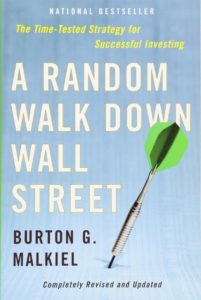 Applying Singh v. RadioShack Corp., 882 F.3d 137 (5th Cir. 2018), which in turn relied upon Fifth Third Bancorp v. Dudenhoeffer, 134 S. Ct. 2459 (2014), the Fifth Circuit rejected a duty-of-prudence claim against an ERISA fiduciary based on the defendants allowing investments to continue a troubled company’s stock. Specifically, the plaintiffs alleged that the defendants “knew that it was inappropriate to rely on the market price of Idearc stock because their own fraudulent activities had caused the public markets to overvalue Idearc stock.” The Court did not agree: “[T]he alleged fraud is by definition not public information, and [Plaintiff] does not address how this information would affect the reliability of the market price ‘as an unbiased assessment of the security’s value in light of all public information.'” No. 16-11590 (June 27, 2018).
Applying Singh v. RadioShack Corp., 882 F.3d 137 (5th Cir. 2018), which in turn relied upon Fifth Third Bancorp v. Dudenhoeffer, 134 S. Ct. 2459 (2014), the Fifth Circuit rejected a duty-of-prudence claim against an ERISA fiduciary based on the defendants allowing investments to continue a troubled company’s stock. Specifically, the plaintiffs alleged that the defendants “knew that it was inappropriate to rely on the market price of Idearc stock because their own fraudulent activities had caused the public markets to overvalue Idearc stock.” The Court did not agree: “[T]he alleged fraud is by definition not public information, and [Plaintiff] does not address how this information would affect the reliability of the market price ‘as an unbiased assessment of the security’s value in light of all public information.'” No. 16-11590 (June 27, 2018).
 Illustrating the sort of highly specific, but highly practical, issues that arise under Twombly, the Fifth Circuit held that “plaintiffs alleging claims under [ERISA] § 1132(a)(1)(B) for plan benefits need not necessarily identify the specific language of every plan provision at issue to survive a motion to dismiss under Rule 12(b)(6) (applying Electrostim Medical Services, Inc. v. Health Care Service Corp., 614 F. App’x 731 (5th Cir. 2015)). It was important to this holding that the plaintiff “was unable to obtain plan documents even after good-faith efforts to do so,” and the insurers “did not produce most of the relevant plan documents until the deadline to re-plead had passed . . . .” Innova Hospital v. Blue Cross, No. 14-11300 (June 12, 2018).
Illustrating the sort of highly specific, but highly practical, issues that arise under Twombly, the Fifth Circuit held that “plaintiffs alleging claims under [ERISA] § 1132(a)(1)(B) for plan benefits need not necessarily identify the specific language of every plan provision at issue to survive a motion to dismiss under Rule 12(b)(6) (applying Electrostim Medical Services, Inc. v. Health Care Service Corp., 614 F. App’x 731 (5th Cir. 2015)). It was important to this holding that the plaintiff “was unable to obtain plan documents even after good-faith efforts to do so,” and the insurers “did not produce most of the relevant plan documents until the deadline to re-plead had passed . . . .” Innova Hospital v. Blue Cross, No. 14-11300 (June 12, 2018).
 Among other Twombly problems, the Fifth Circuit criticized a bankruptcy trustee’s claims about excessive bonuses, noting: “The Trustee does not explain how ATP’s compensation was excessive in comparison to other similarly sized public companies in the oil and gas industry at the time. Indeed,the Trustee offers no metric or explanation for finding the bonuses ‘exorbitant.'” And in this procedural setting, “these pleading deficiencies are ‘particularly striking’ because the Trustee has ample access to ATP’s books and records.” Tow v. Bulmahn, No. 17-30077 (Oct. 27, 2017, unpublished).
Among other Twombly problems, the Fifth Circuit criticized a bankruptcy trustee’s claims about excessive bonuses, noting: “The Trustee does not explain how ATP’s compensation was excessive in comparison to other similarly sized public companies in the oil and gas industry at the time. Indeed,the Trustee offers no metric or explanation for finding the bonuses ‘exorbitant.'” And in this procedural setting, “these pleading deficiencies are ‘particularly striking’ because the Trustee has ample access to ATP’s books and records.” Tow v. Bulmahn, No. 17-30077 (Oct. 27, 2017, unpublished).
 Atlas Trading sued AT&T based on the “filed rate doctrine,” which prohibits a common carrier from charging rates other than those on file with the FCC. The Fifth Circuit affirmed the dismissal of that claim on the pleadings; after a thorough discussion of the requirements of Twombly and Iqbal, the Court observed:
Atlas Trading sued AT&T based on the “filed rate doctrine,” which prohibits a common carrier from charging rates other than those on file with the FCC. The Fifth Circuit affirmed the dismissal of that claim on the pleadings; after a thorough discussion of the requirements of Twombly and Iqbal, the Court observed:
Atlas has neither pled nor shown, though, how these charges are inconsistent with the tariffed rates. That the terms are not found in the tariffs is insufficient. For example, it could allege what it should have been charged under the tariffed rate or compared that to what it was actually charged. It simply asserts that charges such as the composite access-rate charge are not found in the tariffs and from that asks the court to let its claims go forward.
Even accepting as true Atlas’s allegation that the labels for the charges are not found in the tariffs, we cannot make a reasonable inference that the defendants have violated the filed-rate doctrine. At most, we can only infer that certain labels for charges are not found in the tariffs filed with the FCC. Such an inference is not the equivalent of a plausible allegation that the defendants have charged Atlas different rates from those on file with the FCC.
Atlas Trading v. AT&T, No. 16-11661 (Oct. 18, 2017) (emphasis added).
 Body by Cook, Inc. v. State Farm gives a useful reminder about the basic rules for a federal pleading: “[A] complaint may simultaneously satisfy Rule 8’s technical requirements but fail to state a claim under Rule 12(b)(6). Mere compliance with Rule 8 does not itself immunize the complaint against a motion to dismiss. Rule 8(a)(2) specifies the conditions of the formal adequacy of a pleading,” but “it does not specify the conditions of its substantive adequacy, that is, its legal merit.” No. 16-31034-CV (Aug. 24, 2017) (citations omitted).
Body by Cook, Inc. v. State Farm gives a useful reminder about the basic rules for a federal pleading: “[A] complaint may simultaneously satisfy Rule 8’s technical requirements but fail to state a claim under Rule 12(b)(6). Mere compliance with Rule 8 does not itself immunize the complaint against a motion to dismiss. Rule 8(a)(2) specifies the conditions of the formal adequacy of a pleading,” but “it does not specify the conditions of its substantive adequacy, that is, its legal merit.” No. 16-31034-CV (Aug. 24, 2017) (citations omitted).
Plaintiffs alleged that a terrible crime would have been averted with a faster response to a 9-1-1 call. The Fifth Circuit, applying City of Dallas v. Sanchez, 494 S.W.3d 722 (Tex. 2016), found a lack of proximate cause (and thus, immunity applied) because “plaintiffs have not plausibly alleged that any of the intervening parties would have acted differently,” including the call center operator and emergency personnel on the scene. The allegations on the general subject of response time were too speculative to satisfy Twombly (footnote 4). And “‘even if the brief delay in relaying Cook’s location ‘contributed to circumstances that delayed potentially life-saving assistance, the [delay] was too attenuated from the cause of [Cook’s] death . . . to be a proximate cause.” Cook v. City of Dallas, No. 16-10105 (March 29, 2017).
 Recipients of Section 8 housing assistance sued mortgage originators, complaining that the originators either denied or discouraged the recipients’ credit applications by not considering their Section 8 income, in violation of the Equal Credit Opportunity Act. The Fifth Circuit affirmed the dismissal of claims by recipients who had only inquired about, rather than actually starting, the application process, as well as claims based on Wells Fargo’s policies about the purchase of mortgages in the secondary market. It reversed as to one group of applicants, however, finding under Iqbal and the substantive law that they “plausibly alleged that AmeriPro refused to consider their Section 8 income in assessing their creditworthiness as mortgage applicants, and that they received mortgages on less favorable terms and in lesser amounts than they would have had their Section 8 income been considered.” Alexander v. AmeriPro, No. 15-20710 (Feb. 16, 2017).
Recipients of Section 8 housing assistance sued mortgage originators, complaining that the originators either denied or discouraged the recipients’ credit applications by not considering their Section 8 income, in violation of the Equal Credit Opportunity Act. The Fifth Circuit affirmed the dismissal of claims by recipients who had only inquired about, rather than actually starting, the application process, as well as claims based on Wells Fargo’s policies about the purchase of mortgages in the secondary market. It reversed as to one group of applicants, however, finding under Iqbal and the substantive law that they “plausibly alleged that AmeriPro refused to consider their Section 8 income in assessing their creditworthiness as mortgage applicants, and that they received mortgages on less favorable terms and in lesser amounts than they would have had their Section 8 income been considered.” Alexander v. AmeriPro, No. 15-20710 (Feb. 16, 2017).
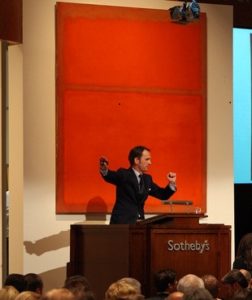 Hoffman v. L&M Arts arose from the sale of a 1961 Rothko painting (right) by Sotheby’s in 2010; a previous owner alleged that this sale revealed facts about her own sale, in violation of a confidentiality provision in the sales contract that said: “All parties agree to make maximum efforts to keep all aspects of this transaction confidential indefinitely.” The Fifth Circuit ruled for the defense in all respects, concluding that:
Hoffman v. L&M Arts arose from the sale of a 1961 Rothko painting (right) by Sotheby’s in 2010; a previous owner alleged that this sale revealed facts about her own sale, in violation of a confidentiality provision in the sales contract that said: “All parties agree to make maximum efforts to keep all aspects of this transaction confidential indefinitely.” The Fifth Circuit ruled for the defense in all respects, concluding that:
- The original owner did not state a fraud claim against the relevant gallery, based on its alleged misrepresentation of its authority to act on behalf of an unnamed buyer, or its alleged misrepresentation about representing an entity or individual. (Notably, the owner did not argue in the district court that equitable relief could still be appropriate without proof of damage), or its claim that the piece would “disappear” into its client’s private collection.
- The contract did not require secrecy about the fact of the sale, based on the plain meaning of the term “aspect,” other provisions in the agreement, and the Texas policy against restraints on alienability.
- The questions about damages associated with the alleged breach either reflected speculative bargains, incorrect damages measures, or a disgorgement theory that is not well-supported as a Texas contract remedy.
No. 15-10046 (Sept. 28, 2016).
 ERISA litigation about investment management presents a tension between the administrators’ fiduciary obligations, on the one hand, and discouraging needless litigation, on the other. After the Supreme Court’s most recent guidance about an ERISA fiduciary’s “duty of prudence” in Amgen Inc. v. Harris, 136 S. Ct. 758 (2016), the Fifth Circuit found that the plaintiffs in Whitley v. BP. PLC failed to meet their pleading burden: “The amended complaint states that BP’s stock was overvalued prior to the Deepwater Horizon explosion due to “numerous undisclosed safety breaches” known only to insiders. In other words, the stockholders theorize that BP stock was overpriced because BP had a greater risk exposure to potential accidents than was known to the market. Based on this fact alone, it does not seem reasonable to say that a prudent fiduciary at that time could not have concluded that (1) disclosure of such information to the public or (2) freezing trades of BP stock—both of which would likely lower the stock price—would do more harm than good. In fact, it seems that a prudent fiduciary could very easily conclude that such actions would do more harm than good.” No. 15-20282 (Sept. 26, 2016).
ERISA litigation about investment management presents a tension between the administrators’ fiduciary obligations, on the one hand, and discouraging needless litigation, on the other. After the Supreme Court’s most recent guidance about an ERISA fiduciary’s “duty of prudence” in Amgen Inc. v. Harris, 136 S. Ct. 758 (2016), the Fifth Circuit found that the plaintiffs in Whitley v. BP. PLC failed to meet their pleading burden: “The amended complaint states that BP’s stock was overvalued prior to the Deepwater Horizon explosion due to “numerous undisclosed safety breaches” known only to insiders. In other words, the stockholders theorize that BP stock was overpriced because BP had a greater risk exposure to potential accidents than was known to the market. Based on this fact alone, it does not seem reasonable to say that a prudent fiduciary at that time could not have concluded that (1) disclosure of such information to the public or (2) freezing trades of BP stock—both of which would likely lower the stock price—would do more harm than good. In fact, it seems that a prudent fiduciary could very easily conclude that such actions would do more harm than good.” No. 15-20282 (Sept. 26, 2016).
 Insurance coverage litigation provided another example of the tension between the “Scylla” of pleading — the “plead more detail” command from Twombly and Iqbal — and its “Charybids” — the principle of insurance law that “[a]ll doubts regarding the duty to defend are resolved in favor of the insured.” Fed Ins. Co. v. Northfield Ins. Co., No. 14-20633 (Sept. 16, 2016). Here, ltigation about pollution liability led to a dispute about whether a “pollution exclusion” eliminated the duty to defend. The Fifth Circuit reversed a summary judgment in favor of the insurer, noting: “ExxonMobil’s petition does not attach any of the petitions in the Louisiana Litigation. ExxonMobil’s petition provides very little information about the nature of the claims made in the Louisiana Litigation, for which ExxonMobil seeks indemnity and defense costs from [the insured].” As a result, “because of the breadth and generality of the allegations in ExxonMobil’s state court petition, we cannot say that all of the claims fall clearly within the exclusion.”
Insurance coverage litigation provided another example of the tension between the “Scylla” of pleading — the “plead more detail” command from Twombly and Iqbal — and its “Charybids” — the principle of insurance law that “[a]ll doubts regarding the duty to defend are resolved in favor of the insured.” Fed Ins. Co. v. Northfield Ins. Co., No. 14-20633 (Sept. 16, 2016). Here, ltigation about pollution liability led to a dispute about whether a “pollution exclusion” eliminated the duty to defend. The Fifth Circuit reversed a summary judgment in favor of the insurer, noting: “ExxonMobil’s petition does not attach any of the petitions in the Louisiana Litigation. ExxonMobil’s petition provides very little information about the nature of the claims made in the Louisiana Litigation, for which ExxonMobil seeks indemnity and defense costs from [the insured].” As a result, “because of the breadth and generality of the allegations in ExxonMobil’s state court petition, we cannot say that all of the claims fall clearly within the exclusion.”
 Whitlock, a truck driver, sued his employer for racial discrimination, alleging that the stated reason for discharge (running a red light at a loading dock) was pretextual. As to discriminatory discharge, “[t]he complaint fails to specify the [comparable] white employees’ work violations” and “fails to allege the white employees’ jobs” with the employer. As to hostile work environment, the complaint alleged that the workplace “was difficult [to] endure,” “caused stress related problems,” and that “[a] white employee was allowed to ride around in a pickup ruck without doing his job but given credit for the work done by African-American employees. The Fifth Circuit affirmed dismissal on the pleadings; this case illustrates a straightforward application of Rule 12 where the substantive law clearly dictates a certain level of detail about the claim. Whitlock v. Lazer Spot, Inc., No. 16-30139 (Aug. 15, 2016, unpublished).
Whitlock, a truck driver, sued his employer for racial discrimination, alleging that the stated reason for discharge (running a red light at a loading dock) was pretextual. As to discriminatory discharge, “[t]he complaint fails to specify the [comparable] white employees’ work violations” and “fails to allege the white employees’ jobs” with the employer. As to hostile work environment, the complaint alleged that the workplace “was difficult [to] endure,” “caused stress related problems,” and that “[a] white employee was allowed to ride around in a pickup ruck without doing his job but given credit for the work done by African-American employees. The Fifth Circuit affirmed dismissal on the pleadings; this case illustrates a straightforward application of Rule 12 where the substantive law clearly dictates a certain level of detail about the claim. Whitlock v. Lazer Spot, Inc., No. 16-30139 (Aug. 15, 2016, unpublished).
 Thomas v. Chevron USA involved a suit for damages after a pirate attack off the shore of Nigeria. The Fifth Circuit reversed the districr court’s denial of leave to amend; on the key issue of duty, the Court observed: “Thomas alleged that Chevron knew about of the real risk of piracy in the region and of the specific threats received by the [ship]. He alleged that despite its knowledge, Chevron requested that the [ship] take an unaccompanied support trip that would pass by the source of the recent threats. Finally, he alleged that Chevron broadcast his route information and locations over easily-accessible VHF radios, through which they could be heard by pirates known to be in the area. These allegations are sufficient to suggest that the harm suffered by Thomas was reasonably foreseeable to Chevron and that Chevron consequently owed him a duty not to subject him to the conditions he encountered . . . .” No. 15-20490 (Aug. 11, 2016).
Thomas v. Chevron USA involved a suit for damages after a pirate attack off the shore of Nigeria. The Fifth Circuit reversed the districr court’s denial of leave to amend; on the key issue of duty, the Court observed: “Thomas alleged that Chevron knew about of the real risk of piracy in the region and of the specific threats received by the [ship]. He alleged that despite its knowledge, Chevron requested that the [ship] take an unaccompanied support trip that would pass by the source of the recent threats. Finally, he alleged that Chevron broadcast his route information and locations over easily-accessible VHF radios, through which they could be heard by pirates known to be in the area. These allegations are sufficient to suggest that the harm suffered by Thomas was reasonably foreseeable to Chevron and that Chevron consequently owed him a duty not to subject him to the conditions he encountered . . . .” No. 15-20490 (Aug. 11, 2016).
In a fraudulent joinder analysis, the Fifth Circuit observed: “The Mastronardis’ claims against Estrada and Marin are insufficiently pled under either the federal standard or the revised Texas standard, which now tracks the federal standard.” Mastronardi v. Wells Fargo Bank, N.A., No. 15-11028 (June 29, 2016) (citing, inter alia, Tex. R. Civ. P. 91a.1). See also Int’l Energy Ventures v. United Energy Group, No. 14-20552 (March 31, 2016).
I recently published an article, titled “Convergence of Federal Rules 8(A) and 9(B) – The Fifth Circuit’s Application of Twombly and Iqbal” in the Southern University Law Review.
 Building on Wooten v. McDonald Transit Associates, Inc., 788 F.3d 490 (5th Cir. 2015), the Fifth Circuit found that a pro se plaintiff had adequately pleaded an ADEA claim in Haskett v. T.S. Dudley Land Co., No. 14-41459 (May 20, 2016, unpublished). Haskett attached his employer’s response to his EEOC charge as an exhibit to his complaint, and the employer argued that the statements in that response negated Haskett’s claim. The Court disagreed: “Haskett clearly did not adopt [his employer’s] allegations to the EEOC as his own for purposes of his complaint. They are therefore still ‘unilateral’ and to the extent they are in tension with the complaint itself, they cannot control.” (citing Bosarge v. Mississippi Bureau of Narcotics, 796 F.3d 435, 440 (5th Cir. 2015)).
Building on Wooten v. McDonald Transit Associates, Inc., 788 F.3d 490 (5th Cir. 2015), the Fifth Circuit found that a pro se plaintiff had adequately pleaded an ADEA claim in Haskett v. T.S. Dudley Land Co., No. 14-41459 (May 20, 2016, unpublished). Haskett attached his employer’s response to his EEOC charge as an exhibit to his complaint, and the employer argued that the statements in that response negated Haskett’s claim. The Court disagreed: “Haskett clearly did not adopt [his employer’s] allegations to the EEOC as his own for purposes of his complaint. They are therefore still ‘unilateral’ and to the extent they are in tension with the complaint itself, they cannot control.” (citing Bosarge v. Mississippi Bureau of Narcotics, 796 F.3d 435, 440 (5th Cir. 2015)).
 In a significant contribution to the Fifth Circuit’s case law applying Twombly and Iqbal, the Court reversed the Rule 12 dismissal of a products liability case in Flagg v. Stryker Corp., recognizing that “in products liability lawsuits, almost all of the evidence is in the possession of the defendant.” The defendants, manufacturers of toe implants, contended that Flagg’s allegations “lack . . .details about how the implants may have deviated from specifications and performance standards” and did not “sufficiently allege an existing and non-burdensome alternative design.” The Court found sufficient detail, for the pleading stage, in Flagg’s allegations that “the shape and sizing of the implants led to the implants’ fracturing and caused them to be difficult to remove once broken,” as well as his allegation that a different alloy would have performed better. It concluded: “Perhaps after discovery Flagg will not prevail, but at a pre-discovery stage of this case, in an area of law where defendants are likely to exclusively possess the information relevant to making more detailed factual allegations, we cannot say that he is merely on a fishing expedition.” No. 14-31169 (April 26, 2016, unpublished).
In a significant contribution to the Fifth Circuit’s case law applying Twombly and Iqbal, the Court reversed the Rule 12 dismissal of a products liability case in Flagg v. Stryker Corp., recognizing that “in products liability lawsuits, almost all of the evidence is in the possession of the defendant.” The defendants, manufacturers of toe implants, contended that Flagg’s allegations “lack . . .details about how the implants may have deviated from specifications and performance standards” and did not “sufficiently allege an existing and non-burdensome alternative design.” The Court found sufficient detail, for the pleading stage, in Flagg’s allegations that “the shape and sizing of the implants led to the implants’ fracturing and caused them to be difficult to remove once broken,” as well as his allegation that a different alloy would have performed better. It concluded: “Perhaps after discovery Flagg will not prevail, but at a pre-discovery stage of this case, in an area of law where defendants are likely to exclusively possess the information relevant to making more detailed factual allegations, we cannot say that he is merely on a fishing expedition.” No. 14-31169 (April 26, 2016, unpublished).
 The financially unfortunate City of New Orleans, saddled with a “just above junk” credit status, hired Ambac to provide insurance for its municipal bonds. Ambac’s AAA rating slipped after the 2008 financial crisis, causing New Orleans to incur tens of millions of dollars in additional debt service and refinancing costs. The City sued Ambac on several legal theories for not maintaining a high credit rating. The Fifth Circuit affirmed their dismissal: “[T]he resolutions that the City so heavily relies upon show only that the City purchased a bond insurance policy from a highly rated insurer, which, at the time of issuance, lessened the perceived credit risk of the City’s bonds. Any alleged representation by Ambac to provide a larger credit enhancement is foreclosed by the clear language of the Policy.” New Orleans City v. Ambac Assurance Corp., No. 15-30532 (March 2, 2016).
The financially unfortunate City of New Orleans, saddled with a “just above junk” credit status, hired Ambac to provide insurance for its municipal bonds. Ambac’s AAA rating slipped after the 2008 financial crisis, causing New Orleans to incur tens of millions of dollars in additional debt service and refinancing costs. The City sued Ambac on several legal theories for not maintaining a high credit rating. The Fifth Circuit affirmed their dismissal: “[T]he resolutions that the City so heavily relies upon show only that the City purchased a bond insurance policy from a highly rated insurer, which, at the time of issuance, lessened the perceived credit risk of the City’s bonds. Any alleged representation by Ambac to provide a larger credit enhancement is foreclosed by the clear language of the Policy.” New Orleans City v. Ambac Assurance Corp., No. 15-30532 (March 2, 2016).
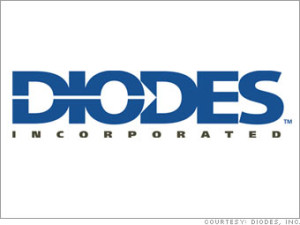 In Local 731 Pension Trust Fund v. Diodes, Inc., the Fifth Circuit affirmed the dismissal of securities claims related to the alleged nondisclosure of labor problems at a Shanghai manufacturing plant, finding a failure to adequately allege scienter. Most basically, the Court observed — “It is important to note the curious nature of the Fund’s claims. To recap the relevant facts: during the class period, Diodes repeatedly warned investors of a labor shortage that would affect its output in the first two quarters of 2011; Diodes accurately warned the precise impact this labor shortage would have on its financial results, not once, but twice. Yet the Fund contends that more disclosure was required.” The Court went on to reject arguments about the unique knowledge of the relevant executives, the company’s decision to make an early product shipment (noting this would have made the labor problem worse and more apparent), and circumstances of an insider’s stock sales. No. 14-41141 (Jan. 13, 2016).
In Local 731 Pension Trust Fund v. Diodes, Inc., the Fifth Circuit affirmed the dismissal of securities claims related to the alleged nondisclosure of labor problems at a Shanghai manufacturing plant, finding a failure to adequately allege scienter. Most basically, the Court observed — “It is important to note the curious nature of the Fund’s claims. To recap the relevant facts: during the class period, Diodes repeatedly warned investors of a labor shortage that would affect its output in the first two quarters of 2011; Diodes accurately warned the precise impact this labor shortage would have on its financial results, not once, but twice. Yet the Fund contends that more disclosure was required.” The Court went on to reject arguments about the unique knowledge of the relevant executives, the company’s decision to make an early product shipment (noting this would have made the labor problem worse and more apparent), and circumstances of an insider’s stock sales. No. 14-41141 (Jan. 13, 2016).
 In Century Surety Co. v. Blevins, the district court dismissed two causes of action related to handling of insurance claims, and then sua sponte dismissed three other related causes of action — breach of contract, estoppel, and vicarious liability. The Fifth Circuit reversed, reminding: “While the district court has great discretion in how it manages its cases, in the Fifth Circuit litigants must — with certain exceptions – be given notice and an opportunity to respond before a district court dismisses claims sua sponte.” No. 14-31131 (Aug. 18, 2015).
In Century Surety Co. v. Blevins, the district court dismissed two causes of action related to handling of insurance claims, and then sua sponte dismissed three other related causes of action — breach of contract, estoppel, and vicarious liability. The Fifth Circuit reversed, reminding: “While the district court has great discretion in how it manages its cases, in the Fifth Circuit litigants must — with certain exceptions – be given notice and an opportunity to respond before a district court dismisses claims sua sponte.” No. 14-31131 (Aug. 18, 2015).
 Wallace sued Tesoro Corporation for retaliation, alleging he was fired for activity protected by the Sarbanes-Oxley Act. he district court dismissed. The Fifth Circuit affirmed in part, finding that Wallace had not exhausted his administrative remedies as to his claims about Tesoro that he did not present to OSHA. Wallace v. Tesoro Corp., No. 13-51010 (July 31, 2015). The Court reversed as to other claims dismissed on the pleadings, holding:
Wallace sued Tesoro Corporation for retaliation, alleging he was fired for activity protected by the Sarbanes-Oxley Act. he district court dismissed. The Fifth Circuit affirmed in part, finding that Wallace had not exhausted his administrative remedies as to his claims about Tesoro that he did not present to OSHA. Wallace v. Tesoro Corp., No. 13-51010 (July 31, 2015). The Court reversed as to other claims dismissed on the pleadings, holding:
- As to the objective reasonableness of Wallace’s belief about an accounting practice — “The basis for that belief in this case, including the level and role of Wallace’s accounting expertise and how that should weigh against him, are grounded in factual disputes that cannot be resolved at this stage of the case.”
- As for Wallace’s reasonable belief that a fraud was occurring, Rule 9(b) is not implicated because “an employee who is providing information about potential fraud or assisting in a nascent fraud investigation might not know who is making the false representations or what that person is obtaining by the fraud; indeed, that may be the point of the investigation.”
- Wallace adequate pleaded the basis for his reasonable belief that Tesoro was not making proper SEC disclosures, and that Tesoro acted with the requisite mental state (primarily by detailing the steps he took to inform Tesoro management). The opinion provides more detail about the specific allegations made by Wallace.
 Plaintiff’s FCA claims about billing for aircraft parts were dismissed for failure to comply with the heightened pleading requirements of Fed. R. Civ. P. 9(b), in that:
Plaintiff’s FCA claims about billing for aircraft parts were dismissed for failure to comply with the heightened pleading requirements of Fed. R. Civ. P. 9(b), in that:
- it is not sufficient to argue that certain federal regulations must have been contained in the relevant contract, because by their terms, they do not automatically apply;
- neither nondisclosure of a part’s history, nor the subsequent failure of a plane containing that part, establishes that a false claim was made about it; and
- speculation about a company’s billing practices does not adequately establish when the company actually submitted the allegedly false claims.
United States ex rel Gage v. Davis S.R. Aviation, LLC, No. 14-50704 (July 14, 2015).
 The plaintiffs/relators in United States ex rel Rigsby v. State Farm contended that, in the wake of Hurricane Katrina, State Farm improperly skewed its claims handling process in favor of finding flood damage, as “wind policy claims were paid out of the company’s own pocket while flood policy claims were paid with government funds.” They won at trial and the Fifth Circuit affirmed, finding that – notwithstanding earlier investigations – they were “paradigmatic . . . whistleblowing insiders” as to this specific claim who qualified as “original sources.” The Court went on to find sufficient evidence of falsity and scienter, and reversed a discovery ruling that would not have allowed the plaintiffs to investigate the facts of other potentially false claims. ” 794 F.3d 457 (5th Cir. 2015). The Supreme Court granted review and affirmed on an issue about violation of the FCA’s sealing requirement.
The plaintiffs/relators in United States ex rel Rigsby v. State Farm contended that, in the wake of Hurricane Katrina, State Farm improperly skewed its claims handling process in favor of finding flood damage, as “wind policy claims were paid out of the company’s own pocket while flood policy claims were paid with government funds.” They won at trial and the Fifth Circuit affirmed, finding that – notwithstanding earlier investigations – they were “paradigmatic . . . whistleblowing insiders” as to this specific claim who qualified as “original sources.” The Court went on to find sufficient evidence of falsity and scienter, and reversed a discovery ruling that would not have allowed the plaintiffs to investigate the facts of other potentially false claims. ” 794 F.3d 457 (5th Cir. 2015). The Supreme Court granted review and affirmed on an issue about violation of the FCA’s sealing requirement.
Moving to dismiss? Drafting a complaint? Educating a colleague? Check out the newly-revised Twombly/Iqbal page on 600Camp, which includes the recent insights from Wooten v. McDonald Transit Associates, No. 13-11035 (June 7, 2015) (statutory employment claim), Owens v. Jastrow, No. 13-10928 (June 12, 2015) (scienter), and mortgage servicing cases.
On rehearing, the Fifth Circuit vacated its earlier panel opinion in Wooten v. McDonald Transit Associates, 775 F.3d 689 (5th Cir. 2015), which reversed a default judgment because of inadequate underlying pleadings, and replaced it with an opinion affirming the default judgment. The new opinion holds that “[a]lthough Wooten’s complaint contained very few factual allegations, we conclude that it met the low threshold of content demanded by Federal Rule of Civil Procedure 8 because it provided McDonald Transit with fair notice of Wooten’s claims.” No. 13-11035 (June 10, 2015). The Court thus continues to reserve the question left open in Nishimatsu Construction Co. v. Houston Nat’l Bank, 515 F.2d 1200 (5th Cir. 1975): “We do not consider here the possibility that otherwise fatal defects in the pleadings might be corrected by proof taken by the court at a hearing.”
 The plaintiffs in Owens v. Jastrow sued officers of Guaranty Bank for securities fraud, alleging that their SEC filings and public comments misstated the vulnerability of the bank’s mortgage-related holdings. No. 13-10928 (June 12, 2015). The Fifth Circuit affirmed dismissal in a detailed opinion, holding, procedurally, that:
The plaintiffs in Owens v. Jastrow sued officers of Guaranty Bank for securities fraud, alleging that their SEC filings and public comments misstated the vulnerability of the bank’s mortgage-related holdings. No. 13-10928 (June 12, 2015). The Fifth Circuit affirmed dismissal in a detailed opinion, holding, procedurally, that:
- “A district court may best make sense of scienter allegations by first looking to the contribution of each individual allegation to a strong inference of scienter, especially in a complicated case such as this one. Of course, the court must follow this initial step with a holistic look at all the scienter allegations”; and
- “Group pleaded” allegations were properly disregarded, although the Court declined to adopt “a strict rule requiring outright dismissal for any group or puzzle pleading[.]”
And on the merits:
- Knowledge of undercapitalization showed motive and opportunity, but does not by itself establish scienter;
- “Defendants’ disclosure of the ‘red flags’ [cited by Plainitiffs] and candidness about the uncertainly underlying its models neutralize any scienter inference from ‘red flags'”; and
- “An inference of severe recklessness is more likely when a statement violates an objective rule than when GAAP permits a range of acceptable outcomes.”
Therefore: “Considered holistically, plaintiffs’ allegations of knowledge of Guaranty’s undercapitalization, a large misstatement, red flags, and ignorance of internal warnings, do not raise a strong inference of severe recklessness that is equally as likely as the competing inference that [Defendants] negligently relief on the AAA ratings and believed that Guaranty’s internal models were accurate.”
Estes sued JP Morgan Chase, alleging violations of the Texas Constitution with respect to a home equity loan. The Fifth Circuit affirmed dismissal on a basic ground: “Estes’s complaint fails to allege any connection between himself and JPMC except that Estes ‘notified [JPMC] that the original promissory note had not been returned,’ and that ‘[m]ore than 60 days have passed since plaintiff notified [JMPC] of its failure to cancel and return the promissory note.’ Considering the allegations in Estes’s complaint, and taking those allegations as true, Estes has not alleged that JPMC possessed the Note at the relevant time. He also has not alleged that he made payments to JPMC, nor has he alleged any other facts from which the Court could reasonably infer that the Note was made payable to “bearer” or to JPMC, as the definition of “holder” set forth in Tex. Bus. & Com. Code § 1.201 requires.” Estes v. JP Morgan Chase Bank, N.A., No. 14-51103 (May 20, 2015, unpublished).
After initially holding that the borrowers’ complaint survived a Twombly challenge as to whether the “grossly inadequate sales price” element of a wrongful foreclosure claim had been properly pleaded, the Fifth Circuit reversed field and issued a revised opinion that affirms dismissal: “We agree with the district court that Plaintiffs’ wrongful foreclosure claim should be dismissed, but for a different reason—Plaintiff’s abandoned the claim on appeal. In challenging the district court’s dismissal, Plaintiffs did not argue that their wrongful foreclosure claim should survive because they adequately pleaded a grossly inadequate sales price. They only argued that the claim should survive because they need not plead that element at all. However, our precedent requires this element in all but a specific category of cases that does not include the instant case.” Guajardo v. JP Morgan Chase, No. 13-51025 (March 10, 2015).
Richardson alleged that he was terminated, in violation of Louisiana’s whistleblower statute, for revealing fraudulent time records and overbilling. The district court granted summary judgment and the Fifth Circuit reversed. Richardson v. Axion Logistics, No. 14-30306 (revised March 23, 2015). Applying the Twombly “plausibility” standard, the Court found adequate pleading about his employer’s knowledge of the alleged misconduct, as well as the timeline of events leading up to his termination. The pleading itself is available for review here; the specific paragraphs identified by the Court as to the employer’s knowledge are highlighted in yellow, and those identified about his termination in orange.
 Felder’s Collision Parts sells aftermarket parts for GM cars; it sued GM and several dealers in original equipment manufactured parts made by GM, alleging that they ran a pricing and rebate program (with the unfortunate name of “Bump the Competition”) that amounted to predatory pricing. The district court dismissed and the Fifth Circuit affirmed in Felder’s Collision Parts, Inc. v. All Star Advertising Agency, No. 14-30410 (Jan. 27, 2015).
Felder’s Collision Parts sells aftermarket parts for GM cars; it sued GM and several dealers in original equipment manufactured parts made by GM, alleging that they ran a pricing and rebate program (with the unfortunate name of “Bump the Competition”) that amounted to predatory pricing. The district court dismissed and the Fifth Circuit affirmed in Felder’s Collision Parts, Inc. v. All Star Advertising Agency, No. 14-30410 (Jan. 27, 2015).
Under the program, a dealer would offer a price significantly lower than the ordinary aftermarket part price. Felder’s argued the dealer was pricing beneath average variable cost — and thus engaging in predatory pricing — and offered an example of a dealer selling a part for $119 that it bought from GM for $135. The defendants pointed out that a key part of the program was a rebate to the dealer from GM based on sales, and including that rebate in the “cost” calculation turned the seeming $15 loss in this example into a 14% profit.
The Fifth Circuit agreed: “The price versus cost comparison focuses on whether the money flowing in for a particular transaction exceeds the money flowing out. The rebate undoubtedly affects that bottom line for All Star by guaranteeing that it makes a profit on any Bump the Competition sale. That undisputed fact resolves the case, as a ‘firm that is selling at a shortrun profit maximizing (or loss-minimizing) price is clearly not a predator.'” The Court acknowledged: “Felder’s no doubt is having a tougher time selling aftermarket equivalent parts for GM vehicles . . . But antitrust law welcomes those lower prices for consumers of collision parts so long as neither GM nor its dealers is selling parts at below-cost levels.” (Or, “parts is parts . . . “)
 The district court dismissed a borrower’s breach of contract claim against a mortgage servicer because the borrower was in substantial arrears, and “as a general principle . . . an individual in breach cannot bring a cause of action for breach against another contracting party.” The Fifth Circuit reversed, finding that the borrower had alleged plausible claims that the servicer breached first; specially, that “the misapplication of [the borrrower’s] payments to an escrow account, resulting in default . . . constituted a material breach,” and that “Chase’s rejection of her mortgage payments, even if not a material breach, rendered performance impossible and that, as a result, any subsequent breach does not bar her claim.” Peters v. JP Morgan Chase, No. 13-50157 (Jan. 23, 2015, unpublished).
The district court dismissed a borrower’s breach of contract claim against a mortgage servicer because the borrower was in substantial arrears, and “as a general principle . . . an individual in breach cannot bring a cause of action for breach against another contracting party.” The Fifth Circuit reversed, finding that the borrower had alleged plausible claims that the servicer breached first; specially, that “the misapplication of [the borrrower’s] payments to an escrow account, resulting in default . . . constituted a material breach,” and that “Chase’s rejection of her mortgage payments, even if not a material breach, rendered performance impossible and that, as a result, any subsequent breach does not bar her claim.” Peters v. JP Morgan Chase, No. 13-50157 (Jan. 23, 2015, unpublished).
The actual pleading is available here, the key averment appears in paragaph 8: “According to the information received from the bank, Defendant believes Plaintiff is over $50,000 in arrears. According to the accounting done by Plaintiff, Plaintiff only owes $31, 437.30. Only $15,000 of this amount is on past due payments. Plaintiff believes that the disparity between the two figures is due to the fact that Chase has misapplied her payments under the mortgage to escrow fund, thereby causing her to be in default under the mortgage.”
While affirming the dismissal of the borrowers’ other claims related to a foreclosure, the Fifth Circuit reversed as to a claim for wrongful foreclosure, reasoning: “Under Texas law, a claim for wrongful foreclosure generally requires: (1) ‘a defect in the foreclosure sale proceedings;’ (2) ‘a grossly inadequate selling price;’ and (3) ‘a causal connection between the defect and grossly inadequate selling price.’ In their Third Amended
Complaint, Plaintiffs allege that JPMC failed to comply with the notice procedures required for a foreclosure sale,and that, as a result, they lost the opportunity to obtain cash or to find a buyer for the Property before JPMC foreclosed. Plaintiffs also specifically allege that the Property sold for a grossly inadequate sales price.” Guajardo v. JP Morgan Chase Bank, N.A., No. 13-51025 (Jan. 12, 2015, unpublished) (citations omitted). Notably, while the pleading describes the type of notice required and avers that it did not occur, it does not provide detail about the sales price and why it was not adequate.
Two rulings for mortgage servicers offer points of general interest to start the New Year:
1. This allegation does not satisfy Twombly, with respect to the intent requirement of the Texas fraudulent lien statute: “the transactions by the Defendants jointly and severally were designed to defraud the Plaintiff out of her property.” The Fifth Circuit found that “this allegation is, at most, a legal conclusion that [Defendant Law Firm] acted with the requisite intent; it lacks any ‘factual content’ that would ‘allow[] the court to draw the reasonable inference that the intent element was met.” Trang v. Taylor Bean & Whitaker Mortgage Corp., No. 14-5028 (Jan. 7, 2015, unpublished).
2. Footnote 1 of the Trang opinion reviews the apparent split in authority on whether a lien assignment falls within the scope of that statute.
3. A borrower seeking refinancing of a mortgage loan is not a consumer under the Texas DTPA. “[T]he refinancing that Perkins sought from BOA is “directly analogous to the [auto] refinancing services sought by the claimant in Riverside [National Bank v. Lewis, 603 S.W.2d 169 (Tex. 1980)].” Perkins v. Bank of America, No. 14-20284 (revised March 4, 2015).
 The United States sued Bollinger Shipyards, alleging that it submitted false claims in connection with upgrades on the Coast Guard’s 110-foot patrol ships (right). The gist of the complaint was that “Bollinger eventually submitted the highest of three [strength] calculations (5,232) to the Coast Guard, while employing in its internal documents the middle calculation (3,037).” As to these strength measurements and their review by an independent agency, an internal email said, “adverse results could cause the entire conversion to be an uneconomical solution” and expressed concern that “we BLOW the program.” United States v. Bollinger Shipyards, Inc., No. 13-31301 (Dec. 23, 2014).
The United States sued Bollinger Shipyards, alleging that it submitted false claims in connection with upgrades on the Coast Guard’s 110-foot patrol ships (right). The gist of the complaint was that “Bollinger eventually submitted the highest of three [strength] calculations (5,232) to the Coast Guard, while employing in its internal documents the middle calculation (3,037).” As to these strength measurements and their review by an independent agency, an internal email said, “adverse results could cause the entire conversion to be an uneconomical solution” and expressed concern that “we BLOW the program.” United States v. Bollinger Shipyards, Inc., No. 13-31301 (Dec. 23, 2014).
While the parties disputed the proper interpretation of this evidence, and the district court agreed with the defendants, the Fifth Circuit reversed: “Rule 12(b)(6) does not require the United States to present its best case or even a particularly good case, only to state a plausible case” that Bollinger acted “in reckless disregard of the truthy or falsity” of the measurements. The Court also held: “The government knowledge defense is not appropriate at the motion to dismiss stage, which requires us to draw all inferences in favor of the United States. It is more proper at the summary judgment or trial stage as ‘a means by which the defendant can rebut the government’s assertion of the “knowing” presentation of a false claim.'”
The Supreme Court recently reversed the Fifth Circuit on a Twombly issue — here is the pleading that “simply, concisely, and directly” stated a civil rights claim.
In the 9-0 per curiam opinion of Johnson v. City of Shelby, the Supreme Court reversed the Fifth Circuit’s dismissal of a civil rights claim for failure to cite the applicable statute: “Our decisions in [Twombly and Iqbal] are not in point, for they concern the factual allegations a complaint must contain to survive a motion to dismiss. A plaintiff, they instruct, must plead facts sufficient to show that her claim has substantive plausibility. Petitioners’ complaint was not deficient in that regard. Petitioners stated simply, concisely, and directly events that, they alleged, entitled them to damages from the city. Having informed the city of the factual basis for their complaint, they were required to do no more to stave off threshold dismissal for want of an adequate statement of their claim.” No. 13-1318, 574 U.S. ___ (Nov. 10, 2014). Law360 has covered the case. Here is the actual pleading at issue.
The State Bar of Texas Litigation Section recently published my article, based on content from this blog, about how the Fifth Circuit has applied Twombly and Iqbal in recent opinions.
Plaintiffs alleged that Amedisys, a provider of home health services, concealed billing improprieties, causing a drop in its stock value when they were revealed. Public Employees’ Retirement System of Mississippi v. Amedisys, Inc., No. 13-30580 (Oct. 2, 2014). The Fifth Circuit reversed the district court’s dismissal on the pleadings, finding adequate allegations of loss causation. It based its holding on the alleged cumulative effect of the five pleaded disclosures of the allegedly concealed information: “This holding can best be understood by simply observing that the whole is greater than the sum of its parts.” In its discussion of the Supreme Court’s treatment of this pleading issue in Dura Phamaceuticals, Inc. v. Broudo, 544 U.S. 336 (2005), the Court pointed out that Dura relied on Conley v. Gibson for its summary of pleading requirements — perhaps inviting a reassessment of that holding in light of later developments under Twombly and Iqbal.
Plaintiffs, citizens of Texas, sued two citizens of Massachusetts and their companies, alleging violations of the Texas Fraudulent Transfer Act. Dontos v. Vendomation NZ Ltd., No. 12-10986 (Sept. 16, 2014, unpublished). The district court dismissed for lack of personal jurisdiction and the Fifth Circuit reversed.
Noting that it was “hesitant to make per se rules regarding fact-specific minimum contacts analysis,” the Court observed generally that “a debtor who is liable under TUFTA to a Texas resident is likely subject to suit in the creditor’s forum state because the debtor acted with actual or constructive fraudulent intent to expressly aim their conduct at a creditor in the forum, where the tort’s harm was felt.” Similarly, while “a mere ‘passive transferee[]” is unlikely to be subject to jurisdiction in the creditor’s resident state,” if ” the transferee ‘precipitate[s] and direct[s] an alleged fraudulent transfer at the expense of a known . . . creditor in Texas,” jurisdiction is likely. (reviewing and applying Mullins v. TestAmerica, Inc., 564 F.3d 386, 400 (5th Cir. 2009) (citing Calder v. Jones, 465 U.S. 783, 789-90 (1984)).
Applying those principles, and accepting the plaintiffs’ allegations as true, the Court found sufficiently detailed allegations to state a prima facie case for personal jurisdiction as to both the debtor and the initial transferees.
Plaintiffs sued for securities fraud, alleging misrepresentations about a company’s capabilities and plans about drilling for oil. Spitzberg v. Houston American Energy Corp.. No. 13-20519 (July 15, 2014). Emphasizing the plaintiffs’ arguments about “the industry definitions of . . . terms” and the timing of events giving rise to an inference of scienter, the Fifth Circuit reversed the dismissal of their claims under the PSLRA,. The Court also found adequate pleading of loss causation. (The significance of industry terminology echoes the reversal of a Rule 12 dismissal about the sale of a loan in Highland Capital Management LP v. Bank of America, although that claim ultimately lost at the summary judgment stage.)
Adding to an April opinion about the proper scope of review for a Rule 12(b)(6) motion, the Fifth Circuit reminded that — In addition to the pleading itself — a court may consider “the documents attached to the complaint, the documents attached to the motion to dismiss which were referred to in the complaint and central to Plaintiffs’ claim, as well as taking judicial notice of matters of public record.” Mitchem v. Fannie Mae, No. 13-10904 (June 9, 2014, unpublished). Mitchem provides citations to published Fifth Circuit authority for each of these points.
Two cases warn against skipping foundational steps (or “not showing your work”):
1. The dismissal of Garcia v. Jenkins Babb, LLP was affirmed for failure to allege facts sufficient under Iqbal to show that an FDCPA claim arose from a consumer transaction; more specifically, “giv[ing] no indication what item was purchased or what service was paid for, much less explain how the item or service was intended for personal or family use.” No. 13-10886 (May 29, 2014, unpublished). (The case returned, and dismissal was again affirmed, in Israel v. Primary Financial Services, No. 14-10012 (May 28, 2015, unpublished)).
2. An award of sanctions was reversed and remanded in Arnold v. Fannie Mae when “the
district court abused its discretion by failing to adequately articulate the authority, the basis, and the reasoning for the sanctions” under Rule 11, inherent power, or 28 U.S.C. § 1927.
The Twombly line of cases emphasizes the importance of detail in pleading. In the insurance context, however, too much detail can defeat coverage. In State Farm v. Moseley, the Fifth Circuit affirmed a summary judgment for an automobile insurer as to the duty to indemnify, concluding that a “volunteer driver” for a healthcare provider fell within the policy’s “for a charge” exclusion. The driver received compensation that, while focused on reimbursement for expenses, could yield profit depending on the route taken and the number of passengers. As to the duty to defend, however, the Court reversed, finding that the following pleading did not unambiguously trigger the exclusion, as it did not allege that “(1) [Plaintiff] gave [Defendant] any payment for transporting her; (2) [Defendant] was operating a taxi service; or (3) the specific amount of compensation [Defendant] received for transporting [Plaintiff]”:
“11. Upon information and belief, Defendant Elizabeth W. Mosley, owned, operated, and controlled, or in the alternative, was doing business as Mosley’s Transportation. Upon information and belief, the Defendant, Elizabeth W. [Mosley], owned, operated, and controlled, or in the alter- native, was doing business as LogistiCare of MS. Further, upon infor- mation and belief, the Defendant, Elizabeth W. Mosley . . . is in the business of transporting patients to and from their medical treatment facilities.
12. The Defendant, LogistiCare Solutions, LLC, in the regular course of business, operates and maintains a non-emergency medical transportation services business . . . .
13. That on or about March 19, 2010, the Deceased, Pearlie Graham, was being transported by the Defendant, Elizabeth W. Mosley, and riding as a guest passenger in a vehicle being driven and operated by the Defendant, Elizabeth W. Mosley, Individually and d/b/a Mosley’s Transportation and/or d/b/a LogistiCare of MS, or in the alternative, [] was acting in furtherance of and within the course and scope of her employment with Defendant, LogistiCare Solutions, LLC . . . . “
The plaintiff in Marucci Sports LLC v. NCAA alleged that the “Bat-Ball Coefficient of Restitution Standard” — a testing protocol “to ensure that aluminum and composite bats perform like wood bats” — was in fact an anticompetitive device calculated to protect the NCAA’s relationship with large bat manufacturers. No. 13-30568 (May 6, 2014). The Fifth Circuit affirmed dismissal, finding: (1) inadequate pleading of a conspiracy under Twombly; (2) inadequate pleading of an injury to “competition among non-wood baseball bat manufacturers” as opposed to its own; and (3) that the standard could fairly be called a procompetitive “rule and condition” of athletic competition. Denial of leave to amend was also affirmed.
While a host of opinions have addressed basic problems with common plaintiffs’ theories in mortgage servicing cases, the recent case of Williams v. Wells Fargo is a useful guide to a wide range of them in a single opinion, including the statute of frauds and its exceptions, waiver, and basic TDCPA and RESPA violations. The Court also reminded that a good contract pleading should identify the specific ways in which a contract has been breached, and found waiver when the grounds were not sufficiently detailed until the appellate level.
Plaintiffs alleged that the members of MERS violated RICO by making fraudulent statements about the legal effect of mortgages nominally recorded in the name of MERS. Welborn v. Bank of New York Mellon, No. 13-30103 (March 5, 2014, unpublished). The district court dismissed under Rule 12(b)(6) on the ground that Plaintiffs impermissibly sought to enforce the Trust Indenture Act by way of a RICO action. The Fifth Circuit affirmed, but on the alternative ground that Plaintiffs had not pleaded a RICO injury to their “business or property.” The alleged injuries — “loss of recording fees and general damage to the integrity of public records” arose “not . . . from commercial activity, but rather from the provision of a public service — that is, a governmental function.”
The Fifth Circuit provided its most thorough recent review of the pleading requirements of Twombly and Iqbal in Merchants & Farmers Bank v. Coxwell, No. 13-60368 (Feb. 7, 2014, unpublished). The issue was whether the plaintiff pleaded a conversion claim relating to an attorney’s distribution of certain funds in alleged violation of a court order. The Fifth Circuit noted that such a claim was cognizable under Mississippi law, and that the plaintiff’s pleading might have satisfied Conley v. Gibson. Under Twombly and Iqbal, however: “The complaint did not specify what court issued the order, when it was issued, or to whom it was directed; the complaint did not describe what the order required and therefore whether the allegation of a violation is plausible or merely fantastical. Further, merely alleging a perfected security interest is insufficient to establish ownership, and the complaint did not describe whether the court order established M&F’s possessory interest in the funds by reducing its claim to judgment.” (citing Funk v. Stryker Corp., 631 F.3d 777, 782 (5th Cir. 2011)).
Due to the nature of its case load, the Fifth Circuit does not often give practical advice on how to plead under Twombly and Iqbal. It has written a handful of cases in the area, though, and the new opinion of Jabaray v. City of Allen adds to that group. No. 12-41054 (Nov. 25, 2013, unpublished). Jabary alleged constitutional claims arising from the revocation of the Certificate of Occupancy for his business (a “restaurant, hookah bar, and tobacco store” that also sold “K2” for a time.) The Fifth Circuit affirmed the Rule 12 dismissal of most defendants, but reversed as to two. The holding of general interest relates to the pleading of the mayor’s involvement in the decision, which was found adequate — the court specifically noted that the pleading said the mayor had suggested to Jabary that he move his business, and that the mayor had a potential financial motive because he owned another business in the relevant mall.
A builder obtained a 6-figure judgment against an architect, for cost overruns and lost profits, resulting from the architect’s negligence. Garrison Realty LP v. Fouse Architecture & Interiors, PC, No. 12-40764 (Oct. 21, 2013, unpublished). The jury awarded distinct sums for negligence and negligent misrepresentation. The Fifth Circuit found that the causes of action were duplicative in this context and reversed as to the inclusion of the smaller award in the final judgment. The Court also held that the defendant had waived an argument for a partial offset as a result of a prior lawsuit, finding that offset had not been pleaded as a defense, and that the plaintiff was prejudiced because it could have changed its trial proof had the issue been raised earlier. (On the pleading issue, the Court noted that the defendant had alleged offset, but only claimed it was a bar “in whole” rather than “in whole or in part.”)
In Meyers v. Textron Inc., the Fifth Circuit affirmed the Rule 12 dismissal of a complaint on res judicata grounds. No.13-10023 (Oct. 2, 2013, unpublished). .Noting that res judicata is ordinarily an affirmative defense, the Court reminded: “When all relevant facts are shown by the court’s own records, of which the court takes notice, the defense [of res
judicata] may be upheld on a Rule 12(b)(6) motion without requiring an answer.” On the merits, the Court found no dispute that the plaintiffs in two cases were in privity given the control one had over the other.
The unpublished opinion of Wiley v. Deutsche Bank National Trust Co. affirms the Rule 12 dismissal of borrwers’ wrongful foreclosure claims, summarizing the 2013 cases from the Fifth Circuit about the “split-the-note” argument against the validity of a MERS assignment. No. 12-51039 (Sept. 16, 2013, unpublished). The opinion reminds that while some borrowers’ claims have survived appellate scrutiny in 2013, a pleading that appears to rehash discredited arguments will not satisfy Twombly and Iqbal. Other unpublished opinions to the same effect are Kramer v. Fannie Mae, No. 12-51171 (Sept. 19, 2013, unpublished), and Epstein v. U.S. Bank NA, No. 13-50047 (Sept. 25, 2013, unpublished).
Persons upset about posts on the Mississippi blog “slabbed.org” sued for defamation in Nova Scotia (some of the content related to a lodge owned there by a Mississippi resident). After obtaining a default judgment, they sought to domesticate it in Mississippi; the defendant removed and resisted domestication under the SPEECH Act, 28 U.S.C. § 4102. Trout Point Lodge v. Handshoe, No. 13-60002 (Sept. 5, 2013). That law, enacted in 2010, intends to prevent “libel tourism” by plaintiffs who obtain judgments in jurisdictions with less protection of speech than the First Amendment. The Court concluded that the plaintiffs failed to meet its burden under the Act to prove either (1) that Canadian law (which allocates the burden to prove falsity differently than American law) offers as much free speech protection as Mississippi, or (2) a Mississippi court reviewing the allegations of the pleading would have found liability for defamation. The Court found some of the pleading’s allegations conclusory and that others involved language that “[t]hough offensive . . . are not actionable . . . .”
In a high-profile “data breach” case, the district court dismissed several banks’ claims against a credit card processor after hackers entered its system and stole confidential information. Lone Star National Bank v. Heartland Payment Systems, No. 12-20648 (Sept. 3, 2013). The banks did not have a contract with the processor. They sought money damages for the cost of replacing compromised credit cards and reimbursing customers for wrongful charges. Applying New Jersey law, the Fifth Circuit found that the economic loss rule did not bar a negligence claim on these facts at the Rule 12 stage. These banks were an “identifiable class,” Heartland’s liability would not be “boundless” but run only to the banks, and the banks would otherwise have no remedy. The Court also noted that it was not clear whether the risk could have been allocated by contract. The Court declined to affirm dismissal on several other grounds such as choice-of-law and collateral estoppel, “as they are better addressed by the district court in the first instance.”
Plaintiff asserted personal jurisdiction under Calder v. Jones, 465 U.S. 783 (1984), alleging that a receiver’s purported misconduct would forseeably damage investors in Texas. Bustos v. Lennon, No. 12-50765 (August 16, 2013, unpublished). The Fifth Circuit affirmed dismissal, finding that the alleged misconduct was not intentionally aimed at Texas, and that jurisdiction did not comport with “fair play and substantial justice” given the status of related litigation in another state.
For the third time in 2013, the Fifth Circuit has reversed, at least in part, the dismissal of foreclosure-related claims under Rule 12 – this time in a published opinion. Miller v. BAC Home Loans Servicing LP, No. 12-41273 (August 13, 2013). The Court began by reminding that the Texas fair debt collection statute is broader than the federal one, and can encompass a servicer. Here, the borrower stated a cognizable claim about the servicer misrepresenting its services (the status of a foreclosure), while failing to do so on several other misrepresentation claims based on other statutory provisions. The Court rejected a DTPA claim because the allegations related to a loan modification — an entirely financial transaction that did not involve a “good” or “service” — and the plaintiffs thus lacked standing. In so doing, the Court distinguished authority finding consumer status as to an original home loan transaction, where the goal can be called obtaining a house. The Court also found that the defendant properly raised the Statute of Frauds as a defense as a Rule 12 ground in opposition to the plaintiff’s promissory estoppel claims.
The plaintiff in Morlock LLC v. Bank of New York sued to quiet title, claiming that it had not received notice of a foreclosure sale despite having an interest in the property. No.12-20832 (August 5, 2013, unpublished). The Fifth Circuit affirmed judgment on the pleadings for the bank, finding the plaintiff’s allegation of an ownership interest “conclusory,” and stating: “Morlock’s petition pleads the initial transaction between the original borrowers and the lender, but the petition does not even suggest how Morlock acquired an ownership interest in the property in the light of the fact that it was not an original borrower. Although Morlock eventually stated that its ownership interest was derived from a Trustee Deed dated August 5, 2011, no copy of that deed was attached to any of the filings, and the deed is not otherwise contained in the record.”
The borrower in Martin-Janson v. JP Morgan Chase alleged waiver and promissory estoppel claims arising from a foreclosure — claims which the Fifth Circuit has not encouraged in 2013 opinions. Here, however, after reviewing the plaintiff’s five allegations about the specific statements made, the Court reasoned: “Based on the foregoing factual allegations, Martin-Janson asserts that she seeks discovery to reveal either the draft loan modification agreement that JPMorgan allegedly prepared, or the terms of her promised modification based on the lender’s standard formulae. In these ways, Martin-Janson argues, she would be able to prove that JPMorgan ‘promise[d] to sign a written agreement which itself complies with the statute of frauds,’ Viewing Martin-Janson’s factual allegations, and the reasonable inferences to be drawn therefrom, in the light most favorable to her, we conclude that she has pled a plausible promissory estoppel claim that potentially avoids JPMorgan’s statute of frauds defense.” (citations omitted). Accordingly, the Court reversed a Rule 12 dismisal of the promissory estoppel claim, while affirming as to waiver. No. 12-50380 (July 15, 2013, unpublished).
Two unpublished cases offer nuts-and-bolts insight on pleading requirements. A pro se copyright infringement complaint failed when the plaintiff “[d]id not plausibly allege that the defendants copied any original work of authorship by her.” Richards v. BP Exploration & Production, No. 12-30508 (April 3, 2013, unpublished). A qui tam suit under the False Claims Act failed to allege fraud with sufficient particularity. The Court noted that while Fed. R. Civ. P. 9(b) applies to FCA claims, its application there is “context specific and flexible,” and a plaintiff can plead with enough particularity “without including all the details of any single court-articulated standard–it depends on the elements of the claim in hand.” Nunnally v. West Calcasieu Cameron Hospital, No. 12-30656 (April 3, 2013, unpublished) (quoting United States ex rel. Grubbs v. Kanneganti, 565 F.3d 180, 189-90 (5th Cir. 2009)).
The Court released a revised opinion in PPI Technologies v. Liberty Mutual, which continues to affirm the dismissal of a coverage case for inadequate allegations of property damage. No. 12-40189 (March 1, 2013, unpublished). The opinion is now unpublished, contains a footnote stating: “Our holding is not intended to alter Texas pleading standards,” and discusses the allegations in Twombly-like language, stating: “The allegations in the underlying lawsuits are either for economic damages, and thus not covered, or are legal conclusions, rather than factual allegations as required.”
An apartment developer sought recovery on a title insurance policy after unfortunate zoning stopped the project. Levy Gardens Partners v. Commonwealth Land Title Insurance, No. 12-30010 (Jan. 31, 2013). The Fifth Circuit affirmed the finding of coverage, concluding, among other matters, that: (1) state court rulings about zoning laws deserved deference by federal courts in later coverage litigation; (2) the state court preliminary injunction litigation about zoning had become a sufficiently “final decree” to trigger coverage; (3) delay in giving notice did not cause prejudice; and (4) the policy did not require the developer to invoke a “conditional use process.” The Court also found, however, that the policy “unambiguously restricts liability to the difference in the value of the title with and without the zoning encumbrance,” thus limiting the insured’s recovery to roughly $650,000 rather than several million in development expenses. In rejecting the insured’s arguments about the policy, the Court also found no prejudicial violation of Fed. R. Civ. P. 8(c) about the pleading of defensive matters.
The plaintiff in Akerblom v. Ezra Holdings sued several companies for damages arising from their business dealings. No. 12-20182 (Jan. 28, 2013, unpublished). Federal jurisdiction turned on whether one defendant, called “Subsea” in the opinion, was improperly joined. To determine whether “the defendant has demonstrated that there is no possibility of recovery by the plaintiff against an in-state defendant,” the Court reminded that the focus is on pleadings at the time of removal — any later pleadings or affidavits can only “amplify or clarify facts alleged in the state-court complaint.” Id. at 7. Applying Texas’s “fair and adequate notice” standard for proper pleading, the Court found that the fraud claim against Subsea failed to say that misrepresentation Subsea allegedly made, or who from Subsea allegedly made it. Id. at 10. There were also substantive issues as to whether several alleged representations were actionable. The Court’s focus on “what” and “who” under Texas law echoes recent opinions under the federal Twombly standard.
The Fifth Circuit affirmed summary judgment for an insurer, reasoning: “We do not consider mere use of the phrase ‘property damage’ and parroted Policy language as sufficient factual allegations. None of the assertions of ‘property damage’ in the underlying lawsuits are accompanied by facts illustrating specific harm or damage to tangbile property.” PPI Technology Services v. Liberty Mutual Ins., No. 12-40189 (Nov. 29, 2012). The closest, an allegation that the insured suffered “property damage throughout the lease where the well was drilled,” was characterized as “simply stating that it owns the property in which the drilling occurred . . . .” Id. at 10. The case analyzes the pleadings under the Texas “eight-corner” test rather than Twombly or Iqbal.
A series of clerical errors led an insurer to overpay a $710,000 settlement by $510,000. National Casualty v. Kiva Construction, No. 12-20217 (Nov. 12, 2012). The insurer sued for breach of contract and “money had and received”; the insured counterclaimed for bad faith in the initial handling of the settlement. The Fifth Circuit affirmed the district court’s summary judgment for the insurer. The Court’s straightforward, unpublished opinion offers two cautionary notes — first, while the settlement agreement did not specify a time for payment of the full amount, a Lousiana statute did so specify (although the insurer complied), and second, the Twombly standards are not in play when the district court obviously considered evidence outside of the pleadings and said in its order that the counterclaims failed “based on the undisputed facts.”
In Gibson v. Texas Department of Insurance, a state regulator sought to prohibit an attorney from using the domain: “texasworkerscomplaw.com.” No. 11-11136 (Oct. 30, 2012). Even assuming the domain name was only commercial speech, the Fifth Circuit reasoned that Texas failed to show that the name was inherently deceptive, and also “made no serious attempt to justify” its regulation as an effort to “prevent misuse of the DWC’s names and symbols.” Id. at 9-10. The Court thus reversed and remanded for consideration of the “misuse” issue and to allow Gibson to show that the domain was “ordinary, communicative speech, and not merely . . . commercial speech.” Its analysis reviewed several cases about trademark issues in the domain name context. Id. at 8 & n.1.
In Highland Capital Management v. Bank of America, the Fifth Circuit reversed a Rule 12 dismissal of a claim for breach of an oral contract. No. 11-11139 (Oct. 2, 2012). The Court noted the practical difficulty of applying the legal test for intent to be bound by an oral contract, largely developed on summary judgment records, in the pleading context. The Court acknowledged that after the phone call in which the plaintiff alleged the contract formed, email called their deal “subject to” further amendment. The plaintiff, however, alleged sufficient facts about whether all material terms were agreed on in the call, the industry custom for the type of transaction, and the nature of the further discussions to state a plausible contract claim. The Court affirmed the dismissal of a promissory estoppel claim for failure to adequately plead reliance.
Globeranger Corp. v. Software AG involved Texas state law claims about the development of a radio frequency identification system. No. 11-10939 (Aug. 17, 2012). The defendants removed and obtained dismissal on the grounds of Copyright Act preemption. The Fifth Circuit agreed that section 301(a) of the Act creates complete preemption, and on the applicable test: “whether [the claim] falls ‘within the subject matter of copyright'” and whether it “protects rights that are ‘equivalent'” to those of a copyright. Id. at 6 (citing Carson v. Dynegy, 344 F.3d 446, 456 (5th Cir. 2003)). After through review of prior cases, the Court held that the conversion claim was likely preempted (thereby maintaining federal jurisdiction), but that the general basis for the claims included business practices excluded from copyright protection, making dismissal at the Rule 12 stage inappropriate. Id. at 10-12.
The plaintiff in Patrick v. Wal-Mart alleged: “Defendants have engaged in a continuing pattern of bad faith . . . [and] have among other things, unreasonably delayed and/or denied authorization and/or payment of reasonable, neceessary and worker’s comp related medical treatment, as well as permanent indemnity benefits, as ordered by [the state agency].” No. 11-60217 at 11-12 (May 17, 2012). The Court found that this allegation “invokes three potentially cognizable theories of liability,” but was “devoid of facts to make it plausible” under Twombly — the pleading “fails to identify the specific time or nature of such wrongs . . . [and] does not identify by date or amount or type of service, any of the alleged bad-faith denials and delays . . . .” Id. It found no abuse of discretion in not allowing further amendment, noting “repeated failure[s] to cure deficiencies . . . .” Id. at 12-13 (quoting United States v. Humana Health Plan, 336 F.3d 375, 387 (5th Cir. 2003)).
The plaintiff in Bowlby v. City of Aberdeen alleged a denial of procedural due process and equal protection rights as to the handling of her license to run a snow cone stand in a particular location. No. 11-60279 (May 14, 2012). The Court applied Twombly and Iqbal to find that she had not stated an equal protection claim, reminding that a pleading should have “facial plausibility” from its “pleaded factual content” and not offer only “labels and conclusions or a “formulaic recitation of the elements of a cause of action.” Op. at 17 (noting “no allegations regarding the types of businesses . . . the size . . . where they are located, or what laws and regulations they have violated”). The Court found an actionable due process issue and rejected a challenge to its ripeness, both under a specialized test for constitutional claims and under “general ripeness principles.” Id. at 14-15 (requiring a claim “fit for judicial decision” as to which delay “would cause . . . further hardship”).
Bass v. Stryker Corp. presents a highly technical analysis of whether state law claims about a hip implant are preempted by the federal Medical Device Amendments to the Food, Drug, and Cosmetics Act. No. 11-10076 (Jan. 31, 2012) The Court found that the manufacturing claims could proceed as “parallel claims that do not impose different or additional requirements than the FDA regulations,” and that certain implied warranty claims survived because they were based on violations of federal requirements. Op. at 19, 23. The Court affirmed the dismissal on preemption grounds of other claims, including an alleged failure to warn. The opinion provides a thorough example of how Twombly applies to a Rule 12 motion based on preemption.
The plaintiff in Kocurek v. CUNA Mutual Insurance sued for fraud about the sale of an insurance policy in 2005 on her husband’s life. (No. 10-51042, Jan. 24, 2012). The defendant persuaded the district court to dismiss on the pleadings, arguing that she lacked standing because she was not a beneficiary of the 2005 policy, and that the policy had a “one policy only” clause that barred claims under an earlier policy. The Court disagreed and reversed, characterizing the plaintiff’s claims as relating to the “practice of selling multiple policies to the same individual,” op. at 4-5, and finding the “one policy only” provision potentially ambiguous and thus not a proper basis for dismissal on the pleadings. Op. at 5. The Court affirmed dismissal of a DTPA claim, as the plaintiff was not the “consumer” who brought the policy. Op. at 5-6.
The case of Turner v. Pleasant presented a rare attack on a judgment by an “independent action in equity.” The underlying dispute involved a personal injury case implicated by the misconduct surrounding disgraced former judge Thomas Porteous. Op. at 2-5. After a clearly-written summary of the pleading requirements of Twombly and Iqbal, op. at 6-7, the Court considered whether the action could proceed, even though similar allegations were made and rejected in an earlier request for relief. The Court reversed the dismissal of the claim and remanded, concluding that the plaintiffs had sufficiently alleged: (1) a prior judgment which ‘in equity and good conscience’ should not be enforced, (2) a meritorious claim in the underlying case, (3) fraud, accident, or mistake which prevented the party from obtaining the benefit of that claim, (4) lack of fault or negligence by the party, and (5) absence of an adequate remedy at law. Op. at 5-10 (citing and contrasting Addington v. Farmer’s Elevator Mutual, 650 F.3d 663 (5th Cir. 1981)).

